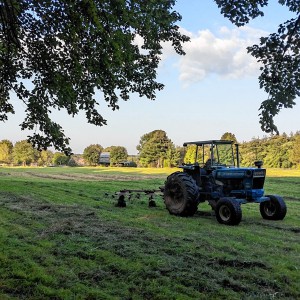Valley Bounty: Valley is ‘veggie bowl’ to the region: Local collaboration helps get our farms’ food to larger metro areas
| Published: 11-14-2023 12:33 PM |
Farms within the three counties of the Connecticut River Valley feed our local community while supplying food to our Commonwealth and the New England region. With farmland concentrated on the western side of the state and the population densest on the eastern side, food naturally flows from our region to the larger cities. Local farms in western Mass. are uniquely positioned, with a responsive market at home and easy highway access to Boston and New York City for expanded distribution.
Two business owners see the landscape of how the Valley contributes to the regional food system. Gideon Porth is the owner of Atlas Farm LLC, an organic mixed-vegetable farm in Deerfield that sells wholesale. “I think our region has a long history of being a vegetable basket for the Commonwealth and beyond. We’re one of the best areas in New England for this vegetable farming due to our soils. I think selling to larger markets has existed for a long time, with many of the growers here in western Mass. sending their products to the Boston area and the wider region,” says Porth.
Atlas Farm handles its own deliveries and also Myers Produce delivers some Atlas produce. Myers Produce is a woman-owned regional trucking company, with hubs in New York City, northern Vermont, and in a new warehouse in Hatfield at the former site of The Food Bank of Western Mass. Owner Annie Myers adds, “As far as Myers goes, a significant portion of the food we buy comes from the Pioneer Valley — almost half — and we sell to customers in the greater Boston area. The farmers we work with here demonstrated a need for someone to help them sell to and deliver to customers in eastern Mass.”
Porth got his start farming in eastern Mass. before starting Atlas Farm in 2004. Already connected to Boston farmers markets, Porth naturally began selling in familiar spaces. As the wholesale side of the business grew, he says, “It was pretty evident that the demand was there. There’s a lot of support for local businesses here in the Valley, but there are more mouths to feed on the other side of the state.”
The Farmers Market at Copley Square was a mainstay for Atlas Farm for 17 years. The markets in the city are run by Massachusetts Farmers Markets, who prioritize Mass. farmers, so few vendors were out-of-state. Porth observed that at least half of the vendors at those markets were from west of Worcester.
Myers Produce began 10 years ago, with Kitchen Garden Farm as their first customer. Word of mouth helped the service grow in the early days, as farms recognized a desire to expand their markets. For Myers, “The vast majority are retail customers. We deliver twice a week, with everything grown and produced in New England. Local is all we carry.”
Myers continues, “Our customers care a lot about where food is grown, the story behind it, and where their money is going. That includes the farm, Myers Produce, and all employees in between. Our customers are values-driven, where quality and ‘buy local’ is highly valued.”
By selling to larger markets, many local farms have thrived. For Atlas Farm, the benefit of selling to a broader population has allowed the farm to expand. Porth notes, “I started as a small market garden, a one-man show with a couple of acres, a pickup truck, and a rototiller. Very quickly, I learned that doing a little more brought us more efficiency. Agriculture has always been an industry of scale. If you can produce on a larger scale with better systems, it pays off.”
Article continues after...
Yesterday's Most Read Articles
 A groundbreaking anniversary: Northampton couple reflects on lead role in legalization of same-sex marriage in Massachusetts 20 years ago
A groundbreaking anniversary: Northampton couple reflects on lead role in legalization of same-sex marriage in Massachusetts 20 years ago
 Rutherford Platt and Barbara Kirchner: ‘Magical thinking’ in downtown Northampton
Rutherford Platt and Barbara Kirchner: ‘Magical thinking’ in downtown Northampton
 Around Amherst: High school sleuths point out $2M mistake in town budget
Around Amherst: High school sleuths point out $2M mistake in town budget
 Photos: Welcome to the Iron Horse stage
Photos: Welcome to the Iron Horse stage
 Area briefs: Free repair event in Northampton; sheep to visit Historic Deerfield; horse ride in Belchertown
Area briefs: Free repair event in Northampton; sheep to visit Historic Deerfield; horse ride in Belchertown
 Mayor’s budget boosts schools 8.5%: Advocates protest coming job cuts as spending falls short of demands
Mayor’s budget boosts schools 8.5%: Advocates protest coming job cuts as spending falls short of demands
The flow of products creates natural efficiencies, such as Myers trucks bringing produce to Boston, and reloading with frozen wild blueberries from Maine or cranberries to deliver to other customers within their network. Myers illustrates the cycle of food succinctly, “We bring tomatoes down to Brooklyn, and they make tomato sauce, then we bring jarred sauce back up to this area for our customers.”
The model Myers Produce uses offers two services: distribution and freight. The distribution service involves buying food from growers and producers, then reselling and delivering to businesses. The freight service involves simply trucking refrigerated products from origins to destinations, leaving buying and selling between the shipper and receiver. Through that service, Myers Produce supports local Community Supported Agriculture (CSA) farms with delivery to drop off points in larger metropolitan areas.
The businesses emphasize relationships as central to their farms and food businesses. Whether collaboration with farmers, restaurant owners and small market owners, or farmers markets, people remain central to the equation of food and farming.
Porth explains how farmers work together, “We definitely collaborate with other farms for distribution. My farm might have baby tomatoes mid-season, while another farm has baby lettuce to bring to market. If my farm can’t serve an opportunity, we work together to ensure another farm takes it.”
Myers explains, “Collaborating with local farmers to get food to the world is what we do. The reason we started our company was to provide a service to farmers that is truly helpful, and it’s exciting to see our business have a positive effect in real time. We get feedback from farms that our operation has allowed farms to grow differently or focus on their farm, and that is satisfying.”
A broader distribution network supports local farms, feeds people, and continues to care for the land.
“It still fires me up,” Porth says. “Growing food still feels like an important thing to do.”
Lisa Goodrich is communications coordinator for Community Involved in Sustaining Agriculture (CISA). Try our online guide at buylocalfood.org to help you buy local this season for ingredients, prepared foods and gifts.






 Valley Bounty: Grass-fed animals that feed the grass: Gwydyr Farm in Southampton focuses on ‘restoring the connection between land, food and people’
Valley Bounty: Grass-fed animals that feed the grass: Gwydyr Farm in Southampton focuses on ‘restoring the connection between land, food and people’ Weekly Food Photo Contest: This week’s winner: Mary Chicoine of Easthampton
Weekly Food Photo Contest: This week’s winner: Mary Chicoine of Easthampton  Speaking of Nature: A romantic evening for two birders — To hear the wonderful sounds of the Saw-whet Owl one must go outside at night
Speaking of Nature: A romantic evening for two birders — To hear the wonderful sounds of the Saw-whet Owl one must go outside at night Speaking of Nature: Where have all the birds gone?: They’re there, and here’s a handy tool to keep track of their appearances
Speaking of Nature: Where have all the birds gone?: They’re there, and here’s a handy tool to keep track of their appearances
